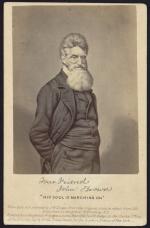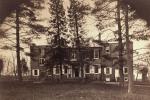![header=[Marker Text] body=[The home of James Buchanan, statesman, diplomat and the fifteenth President of the United States (1857-61), is located on Marietta Avenue, seven blocks south. Buchanan maintained Wheatland as his home from 1848 until he died there on June 1, 1868.
] sign](kora/files/1/10/1-A-116-139-ExplorePAHistory-a0a4q2-a_450.gif)
Mouse over for marker text
Name:
Wheatland
Region:
Hershey/Gettysburg/Dutch Country Region
County:
Lancaster
Marker Location:
N. President Ave. near Harrisburg Pike, Lancaster
Dedication Date:
May 14, 1971
Behind the Marker
Wheatland was a place suitable for a potential nineteenth-century presidential candidate. After a distinguished career in the United States Congress and his tenure as Secretary of State,  James Buchanan decided to purchase the property, about a mile from the center of Lancaster, in 1848 for this reason.
James Buchanan decided to purchase the property, about a mile from the center of Lancaster, in 1848 for this reason.
Originally built in 1828 in the Federal style of architecture, the home was named "Wheatlands" after nearby wheat fields. Large and substantial, Wheatland boasted a main structure flanked by two wings, all constructed in brick.
A year after settling into his new country estate, Buchanan wrote to a former Washington colleague, "I presume you may have supposed I would be in that City, now the grand theatre of President making. But that is not my way."
Instead, Buchanan preferred to adopt what was then considered a more traditional posture for a prospective president – total indifference to partisan politics. Democratic newspapers began to refer to him as the "The Sage of Wheatland," and within a few years, he emerged as the party's top candidate for the nation's highest office.
At Wheatland, Buchanan busied himself directing improvements to the building and grounds. He hired a gardener to plant 1,200 strawberries and made extensive renovations. Pleased with his new home, Buchanan wrote happily, "we have concerts of birds every morning." He read extensively and entertained guests frequently.
Following his election to the presidency, Buchanan received numerous visitors at the residence. Newspaper reports estimated that up to 400 people each day passed through Wheatland's doors. Buchanan returned occasionally during his presidency, especially when Congress was out of session, and resumed his life as a private citizen at the estate in 1861.
The ex-president was urged to evacuate his Lancaster home during the Gettysburg campaign of 1863, but he stubbornly refused. "I felt no alarm at the approach of the rebels," he informed his closest friend, "and with the help of God should not have removed from Wheatland had I been surrounded by a hundred thousand of them." Buchanan died at Wheatland in 1868.
Originally built in 1828 in the Federal style of architecture, the home was named "Wheatlands" after nearby wheat fields. Large and substantial, Wheatland boasted a main structure flanked by two wings, all constructed in brick.
A year after settling into his new country estate, Buchanan wrote to a former Washington colleague, "I presume you may have supposed I would be in that City, now the grand theatre of President making. But that is not my way."
Instead, Buchanan preferred to adopt what was then considered a more traditional posture for a prospective president – total indifference to partisan politics. Democratic newspapers began to refer to him as the "The Sage of Wheatland," and within a few years, he emerged as the party's top candidate for the nation's highest office.
At Wheatland, Buchanan busied himself directing improvements to the building and grounds. He hired a gardener to plant 1,200 strawberries and made extensive renovations. Pleased with his new home, Buchanan wrote happily, "we have concerts of birds every morning." He read extensively and entertained guests frequently.
Following his election to the presidency, Buchanan received numerous visitors at the residence. Newspaper reports estimated that up to 400 people each day passed through Wheatland's doors. Buchanan returned occasionally during his presidency, especially when Congress was out of session, and resumed his life as a private citizen at the estate in 1861.
The ex-president was urged to evacuate his Lancaster home during the Gettysburg campaign of 1863, but he stubbornly refused. "I felt no alarm at the approach of the rebels," he informed his closest friend, "and with the help of God should not have removed from Wheatland had I been surrounded by a hundred thousand of them." Buchanan died at Wheatland in 1868.







